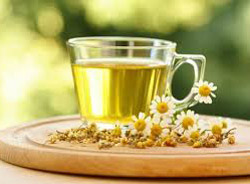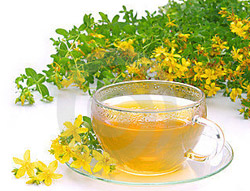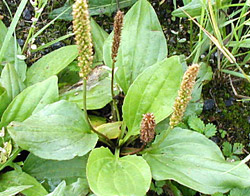Phytotherapy and Pancreatitis
For the treatment of pancreatic diseases herbal medicine is used mostly as a part of a combination therapy. Phytotherapy can be used for the treatment of patients with uncomplicated forms of chronic pancreatitis when there is no exacerbation of the disease or when the disease is in the phase of partial remission. Usually the plants that stimulate regeneration of tissues as well as those having antispasmodic and anti-inflammatory effects are indicated for pancreatic diseases. Herbal teas are the most commonly used herbal remedies.
The course of herbal treatment of chronic pancreatitis can vary depending on the peculiarities of the disease development in every particular patient:
- the frequency of exacerbations;
- the form of pancreatitis;
- the degree of impairment of pancreatic function.
If exacerbations of the disease are rare (recurrent form), herbal therapy can be conducted for 1.5 – 2 months as a seasonal anti-relapse treatment; if a patient experiences chronic pain – almost constantly. Patients with the signs of pancreatic function impairment should take digestive enzymes and hormonal agents together with herbal remedies.
In general, medicinal herbs used for the treatment of pancreatitis can be divided into several groups:

- If there are any necrotic processes, it is necessary to use regenerative plants that stimulate regenerative function of pancreatic tissues. These are German chamomile (Matricaria chamomilla), common yarrow (Achillea millefolium), common plantain (Plantago major), silverweed (Potentilla anserina), yellow sweet clover (Melilotus officinalis), field horsetail (Equisetum arvense), common tansy (Tanacetum vulgare), spotted lady's thumb (Polygonum persicaria), common St. Johnswort (Hypericum perforatum), pot marigold (Calendula officinalis), white birch, ground ivy (Glechoma hederacea), meadow geranium (Geranium pratense), marsh cudweed (Gnaphalium uliginosum), double cinnamon rose (Rosa majalis J. Herrm.). Extracts of the following herbs in addition to their ability to stimulate regeneration have an anti-inflammatory action – birch leaves, pot marigold flowers, flowers of mullein (Verbascum) and Filipendula, flax seeds (Linum),licorice roots (Glycyrrhiza glabra), marsh cudweed, johnny-jump-up (Viola tricolor);

- The treatment of acute infectious pancreatitis should be accompanied with the use of antimicrobial herbs - common St. Johnswort (Hypericum perforatum), common yarrow (Achillea millefolium), European barberry (Berberis vulgaris), common tansy (Tanacetum vulgare),common plantain (Plantago major), pot marigold, tormentil (Potentilla erecta), field horsetail (Equisetum arvense), cowberry leaves (Vaccinium vitis-idaea), white birch, etc.;

- In addition, medicinal plants with detoxifying effect should be used - wood betony (Stachys officinalis), garden valerian (Valeriana officinalis), garden cornflower (Centaurea cyanus),meadow geranium (Geranium pratense),Elecampane (Inula helenium), woodland angelica (Angelica sylvestris), common St. Johnswort, goat willow (Salix caprea), fireweed (Chamerion angustifolium), European centaury (Centaurium erythraea Rafn), pot marigold, great burnet (Sanguisorba officinalis), meadowsweet (Filipendula ulmaria (L.) Maxim.), marsh cinquefoil (Comarum palustre), greater burdock (Arctium lappa),raspberry (Rubus idaeus), lady's mantle (Alchemilla vulgaris), peppermint, common plantain, quackgrass (Elymus repens (L.) Gould),double cinnamon rose, German chamomile, marsh cinquefoil (Comarum palustre), sticky catchfly (Silene viscaria), Scots pine (Pinus sylvestris), common yarrow, three-lobe beggarticks (Bidens tripartita);
- And plants with a strong sedative and antispasmodic effect – motherwort (Leonurus), linden blossom, roots and rhizome of garden valerian, common hop cones (Humulus lupulus), mint flowers, etc.
During remission phase it is particularly important to pay special attention to the treatment of biliary dyskinesia, gallbladder inflammation and dysbiosis.
Extreme caution is required when using stimulants of the digestive gland secretion such as common St. Johnswort, common dandelion roots (Taraxacum officinale), common plantain leaves, buckbean (Menyanthes trifoliata), etc., because they can disturb the unstable balance (characteristic for pancreatitis) between the activators and inhibitors of pancreatic enzymes and, thus, provoke exacerbation of the disease.
Here are some possible examples of herbal teas
Herbal tea 1 (it is good for the first days of acute pancreatitis when the nature of changes in the pancreas is not clear yet)

- German chamomile 2 parts
- Common St. Johnswort (herb) 1 part
- Common agrimony (Agrimonia eupatoria) (herb) 1 part
- Common plantain (leaves) 2 parts
- Peppermint (leaves) 2 parts
1 tablespoon of dried herbs to be mixed with 500 ml (16.9 fl oz) of boiling water and left to infuse for 30 minutes. Take the remedy as follows – ¼ cup every hour during 2 days, then ½ cup 4 times a day 15-20 minutes before meals and before going to bed. The treatment should last for 5-10 days.
Herbal tea 2 (for various forms of pancreatitis (acute, chronic) and recurrent pancreatic diseases)

- Garden sage (Salvia officinalis) (leaves and stems) 3 parts
- Pot marigold (flowers) 3 parts
- Greater burdock (roots) 3 parts
- Red clover (Trifolium pratense) (flowers) 2 parts
- Common agrimony (herb) 2 parts
- Common dandelion (roots) 2 parts
Mix 2 tablespoons of the blend with 500 ml (16.9 fl oz) of boiling water and let it infuse in vacuum flask for 4-5 hours (the first 10 minutes - with an open plug). Once done, strain the infusion. Take ½ cup of the infusion 4 times per day 30 minutes before meals, the 4th intake should be before going to bed. Take the infusion until the pains disappear and then for another week. If you have low blood pressure or kidney stones, then the dose should be halved but the length of treatment should be doubled.
Herbal tea 3 (for chronic pancreatitis, as an anti-relapse treatment)

- Dill (seeds) 3 parts
- Mint (leaves) 3 parts
- Hawthorn (Crataegus) (fruit) 2 parts
- Strawflower (Helichrysum) (flowers) 2 parts
- Chamomile (flowers) 1 part
5 g (0.18 oz) of dried herbs should be mixed with 1 cup of boiling water and heated using boiling water bath for 30 minutes, left to infuse for 1 hour, and then pressed out. Take 50 ml (1.7 fl oz) of the infusion 3 times a day 1 hour after meals.
Herbal tea 4 (for chronic pancreatitis)

- Anise (Pimpinella anisum) (fruit) 1 part
- Corn silk 1 part
- Common dandelion (roots) 1 part
- Prostrate knotweed (Polygonum aviculare) (herb) 1 part
- Common St. Johnswort (herb) 1 part
- Johnny-jump-up (herb) 1 part
5 g (0.18 oz) of the blend should be mixed with 1 cup of boiling water and heated using boiling water bath for 30 minutes, left to infuse for 10 minutes, and then pressed out. Take 200 ml (6.76 fl oz) of the infusion 3 times per day before meals.
Herbal tea 5 (for chronic pancreatitis and to prevent relapse of the disease)

- Caraway (Carum) (seeds) 3 parts
- Stinging nettle (Urtica dioica) (leaves) 3 parts
- Sweetflag (Acorus calamus) (roots) 1 part
- Garden valerian (roots) 1 part
- Common yarrow (herb) 1 part
Mix 5 g (0.18 oz) of dried herbs with 1 cup of boiling water and heat it using boiling water bath for 30 minutes, let it infuse for 10 minutes, and then press out. Take 100 ml (3.38 fl oz) of the infusion 3 times per day 1 hour after meals.
Herbal tea 6 (for chronic pancreatitis to prevent its relapse)
- Mint (leaves) 2 parts
- Stinging nettle (leaves) 2 parts
- Buckthorn (Frangula) (bark) 3 parts
- Sweetflag (roots) 1 part
- Garden valerian (roots) 1 part
Mix 5 g (0.18 oz) of dried herbs with 1 cup of boiling water and heat it using boiling water bath for 30 minutes, leave it for 10 minutes to infuse and press out. Take 50 ml (1.7 fl oz) of the infusion 2 times per day (in the morning and in the evening) before meals. To cope with constipation. Course of treatment – 5-7 days.
Herbal tea 7 (for chronic pancreatitis, as an anti-relapse treatment)

- Buckthorn (bark) 2 parts
- Buckbean (leaves) 1 part
- Mint (leaves) 1 part
- Common dandelion (roots) 1 part
5 g (0.18 oz) of the blend to be mixed with 1 cup of boiling water and heated using boiling water bath for 30 minutes, left to infuse for 10 minutes and then pressed out. Method of application is the same as for the herbal tea 6.
Herbal treatment plays a subsidiary role in the combination therapy of pancreatitis. However, skillful use of phytotherapy can help avoid complications and prolong remission.

